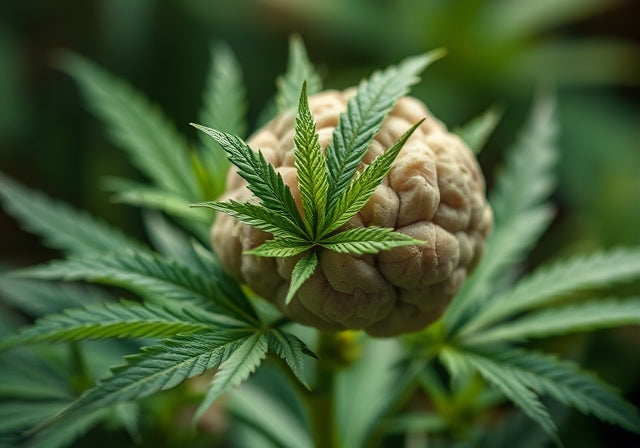
Does Cannabis Kill Brain Cells? The Truth About Long-Term Use
by Dexter Cann
·
Cannabis has sparked widespread debates about its effects on the human brain, especially with the increasing legalization and acceptance of its use. One of the most pressing concerns is whether cannabis kills brain cells and what long-term consequences might arise from regular consumption. This article delves into the science behind cannabis and brain health, addressing myths and facts to provide a clear picture for both enthusiasts and skeptics.
Understanding Cannabis and Its Components
Cannabis contains over 100 chemical compounds known as cannabinoids. The two most researched and widely discussed are tetrahydrocannabinol (THC) and cannabidiol (CBD):
-
THC: The psychoactive compound responsible for the "high" associated with cannabis use.
-
CBD: A non-psychoactive compound believed to offer various therapeutic benefits, such as reducing anxiety and inflammation.
These compounds interact with the body’s endocannabinoid system (ECS), a network of receptors that regulate functions such as mood, memory, appetite, and sleep. While cannabis can influence the ECS, its long-term impact on brain cells remains a topic of ongoing research.
The Myth: Cannabis Kills Brain Cells
The notion that cannabis kills brain cells originates from early studies conducted decades ago. One such infamous experiment involved exposing monkeys to high doses of cannabis smoke. Researchers concluded that brain cell death occurred, but the methodology has since been heavily criticized. The primates were deprived of oxygen during the study, which likely contributed to the observed brain damage, rather than the cannabis itself.
Modern research provides a more nuanced perspective. Cannabis does not directly kill brain cells, but its impact on brain function, especially during developmental stages, warrants a closer look.
Cannabis and the Developing Brain
Adolescents and Young Adults: The brain continues to develop until the mid-20s, with the prefrontal cortex—responsible for decision-making and impulse control—being one of the last areas to mature. Studies suggest that frequent cannabis use during adolescence may:
-
Impair cognitive functions such as memory, attention, and learning.
-
Alter the structure of the hippocampus, a region crucial for memory.
-
Lead to reduced connectivity between brain regions.
It’s important to note that these changes are often associated with heavy, prolonged use during critical developmental periods. Moderate or occasional use appears to have far less significant effects.
Cannabis and Adult Brain Health
In adults, the relationship between cannabis and brain health is less clear-cut. Some studies highlight potential risks, while others emphasize benefits:
-
Neuroprotection: Certain cannabinoids, especially CBD, exhibit neuroprotective properties, potentially shielding brain cells from damage caused by conditions such as Alzheimer’s disease or traumatic brain injury.
-
Memory Impairment: THC can temporarily affect short-term memory, but these effects typically subside after discontinuing use.
-
Mood Disorders: Chronic, heavy use may exacerbate mental health issues like depression or anxiety in predisposed individuals.
For adults, the key determinant is often dosage and frequency. Moderate use in controlled environments is unlikely to cause significant harm, but excessive consumption may lead to undesirable effects.
The Science of Neurogenesis and Cannabis
One intriguing area of research is neurogenesis, the process of forming new neurons in the brain. Studies suggest that:
-
THC might inhibit neurogenesis in specific brain regions at high doses.
-
CBD, on the other hand, may promote neurogenesis, highlighting its potential therapeutic benefits.
This duality underscores the importance of the THC-to-CBD ratio in cannabis products. Consumers seeking cognitive benefits or minimal side effects may benefit from strains with higher CBD content.
Cannabis Use and Lifestyle Factors
The impact of cannabis on brain health doesn’t exist in isolation. Lifestyle factors play a significant role in determining outcomes:
-
Diet: A nutrient-rich diet can counteract potential deficits caused by cannabis.
-
Exercise: Regular physical activity promotes neurogenesis and overall brain health.
-
Sleep: Cannabis can influence sleep quality, with low doses often improving rest and higher doses causing disturbances.
By adopting healthy habits, individuals can mitigate potential risks associated with cannabis use.
Benefits of Responsible Cannabis Use
While concerns exist, there’s also evidence supporting the positive effects of cannabis on brain health:
-
Chronic Pain Management: Cannabis can reduce reliance on opioids, which have their own detrimental effects on the brain.
-
Stress Reduction: Lower stress levels contribute to better cognitive function and overall mental well-being.
-
Therapeutic Potential: Emerging research explores cannabis’s role in treating conditions like PTSD, epilepsy, and multiple sclerosis.
The key lies in responsible consumption—understanding personal tolerance, choosing quality products, and avoiding excessive use.
Busting Common Myths
-
"Cannabis Makes You Less Intelligent": While cannabis can temporarily impair cognitive function, no evidence suggests permanent IQ reduction in adults who use it moderately.
-
"Cannabis Causes Permanent Brain Damage": Research indicates that most effects are reversible upon cessation, especially in adults.
-
"All Cannabis Products Are the Same": The THC-to-CBD ratio, consumption method, and product quality significantly influence outcomes.
Choosing Safe and Effective Storage for Cannabis
Storing cannabis properly is essential for preserving its potency, flavor, and safety. Improper storage can lead to:
-
Degradation: Exposure to light, air, and moisture can reduce the effectiveness of cannabinoids.
-
Contamination: Poor storage increases the risk of mold or bacterial growth.
-
Odor Issues: Without proper containment, cannabis can release strong, lingering smells.
That’s where a high-quality stash box comes into play. Purpose-built stash boxes ensure:
-
Optimal Freshness: By maintaining a controlled environment, your cannabis stays potent longer.
-
Discreet Storage: Keep your collection secure and odor-free.
-
Stylish Design: Modern stash boxes double as functional art pieces, complementing your home decor.
Conclusion
Cannabis does not kill brain cells, but its impact on brain health varies based on factors like age, frequency, and lifestyle. Responsible use—paired with proper storage solutions—ensures that you can enjoy its benefits while minimizing risks.
Ready to elevate your cannabis experience? Explore Cubbi’s premium stash boxes today for the perfect blend of style, security, and preservation. Whether you're a seasoned enthusiast or new to cannabis, Cubbi’s stash boxes are designed to meet your needs.